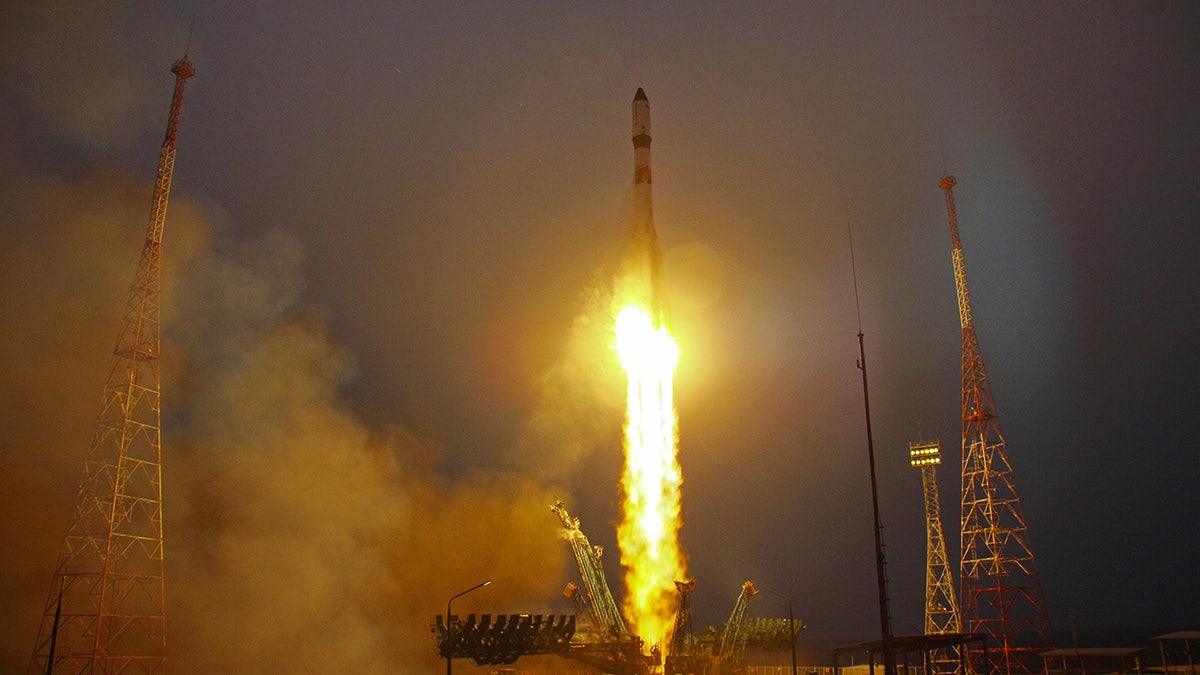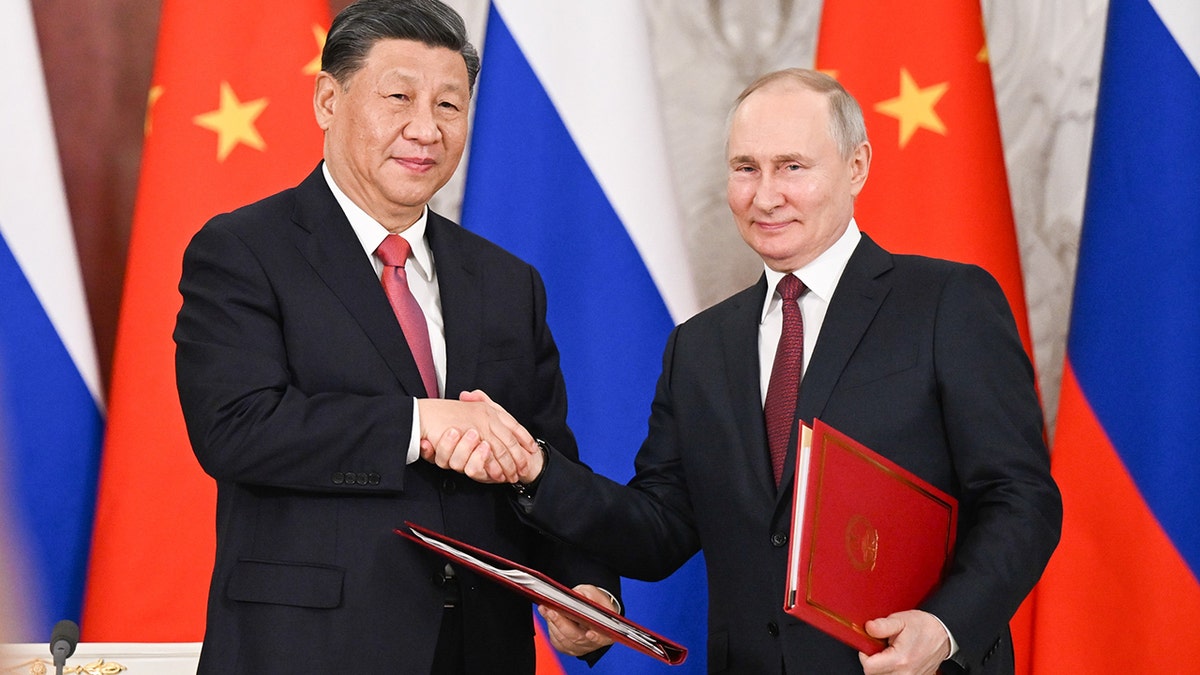Biden admin accused of 'sleepwalking' on Russian nuke threat
Republican presidential candidate Nikki Haley joins 'Fox & Friends' to discuss the threat of Russia's plans to send nuclear weapons to space and argue former President Trump 'won't win' in 2024
You heard Russian President Vladimir Putin is working on a nasty, new nuclear anti-satellite weapon. Leaders in Congress were briefed last week in a highly secret session, but it left me wondering: exactly what is Putin targeting?
Putin could make a real mess if he detonates a nuclear weapon on orbit.
America exploded a 1.45 megaton nuke in space over the Pacific in July 1962. "Crime of the atom-mongers," wailed the Soviet Union. The experiment lit up the skies with sinister red and pink blotches and knocked out phone service in Honolulu, 1,100 miles away.
Back then, the U.S. had only a handful of satellites in orbit. Radiation from what they called the Starfish Prime test settled into the Van Allen Belts that gird our planet and wore out a brand-new AT&T Telstar communications satellite after just a few months. Aghast, the U.S. and Soviet Union gave up exoatmospheric tests and signed the Limited Test Ban Treaty in 1963.

In this photo released by Roscosmos State Space Corporation, Russian Soyuz 2.1a with the Progress MS-26 cargo spaceship blasts off at the Russian leased Baikonur cosmodrome in Baikonur, Kazakhstan, on Thursday, Feb. 15, 2024. Russia's military use of space poses a serious threat to the U.S. (Roscosmos State Space Corporation via AP)
But today, a Russian space nuke could do far, far more damage.
Now, I doubt Putin wants to take out all the 8,377 worldwide satellites in orbit, especially since some are Russian. More likely, he wants to threaten specific American systems. Here are three top possibilities, and they’re all pretty scary.
First is the missile warning Space-Based Infrared System or SBIRS. The big satellites essentially perch 22,000 miles up and peer at the earth to detect the heat flare from missile launches. Infrared detection is crucial to missile warning and defense – over Kyiv or South Korea or the USA. It’s a 24/7 mission and there are only a handful of the big SBIRS satellites. Lockheed Martin delivered the sixth and last one in 2022. If Putin blinded SBIRS, goodbye missile warning.
Then, of course, there is the Global Positioning System that keeps your daily life and America’s economy humming. Over 30 GPS satellites triangulate a radio signal to give you your location (latitude, longitude and altitude) anywhere, anytime. GPS also emits a precision timing signal.
Every day you are surrounded by this magic, invisible mesh of data transport run via space. GPS data is used by cellphone towers, electric grids, ATMs, airplanes, the New York Stock Exchange, credit card transactions and, of course, your smartphone. No GPS means no maps or apps. And no precision all-weather bombing by the Air Force and Navy, either.
The GPS constellation lives 12,000 miles up in medium earth orbit and runs on solar panels. Former NASA administrator Michael Griffin warned as far back as 2017 that GPS was vulnerable. Most worry about jamming of the GPS signal, but a nuke on orbit could fry the solar panels. Both Russia and China have their own separate GPS-like navigation constellations, so maybe Putin wouldn’t care. His oligarch buddies could still make phone calls. Not outside Russia, though.
What if Putin isn’t after a satellite, but a space plane? There’s a chance Putin wants to shake his fist at America’s X-37 unmanned spaceplane. For sure, Russia has nothing like it. The X-37 is a secretive, orbital test vehicle about the size of UPS brown van. No one will say exactly what it does, but for sure, Russia has nothing like it. The X-37B stayed up in orbit for 908 days on its last mission. Cool, huh?

Chinese President Xi Jinping and Russian President Vladimir Putin shake hands after jointly signing a joint statement in Moscow, Russia, March 21, 2023. A viable Russian space nuclear threat might help Putin impress Xi. (Xie Huanchi/Xinhua via Getty Images)
Another X-37 mission just launched Dec. 28 on the SpaceX Falcon Heavy – that’s an Elon Musk rocket. Aloft, it will be "experimenting with space domain awareness technologies and investigating the radiation effects to NASA materials," the Space Force said in December.
CLICK HERE FOR MORE FOX NEWS OPINION
Space domain awareness is code for figuring out what everybody else is up to on orbit. Like I said, we don’t really know what the X-37 does, but it has a significant mission and Putin may be toying with a space nuke to intercept it.
Putin’s fishy space nuke may have two other goals. First, rattle the U.S. After all, American prowess in the space domain helps give Ukraine the information edge against Russia.
Now, I doubt Putin wants to take out all the 8,377 worldwide satellites in orbit, especially since some are Russian. More likely, he wants to threaten specific American systems. Here are three top possibilities, and they’re all pretty scary.
Second, Putin wants to impress China. Every day, Russia becomes more and more the junior partner in the horrid, no-limits friendship with China. Nuclear weapons are about the only thing Putin’s got more of. Brandishing a space nuke is also meant to wow Chinese President Xi Jinping and his generals. For while they are in a marriage of convenience now, Russia and China haven’t always gotten along.
CLICK HERE TO GET THE FOX NEWS APP
Fortunately, the United States Space Force has been tracking Putin’s nonsense for quite some time now. The Pentagon is racing to build and launch a completely new architecture of smaller, networked satellites. In a few years, they will take over the key military functions which older, bigger satellites perform today, and the whole American space architecture will be much less vulnerable.
They’d better hurry. China is also at work on anti-satellite capabilities, including a ground-based laser. Xi and crew may not need a space nuke to disrupt space.












































